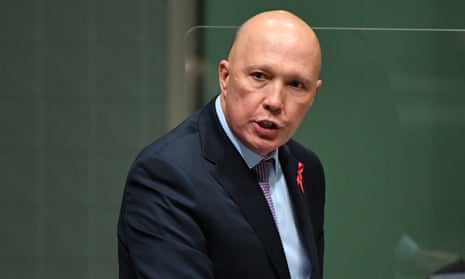Peter Dutton failed to explain how deporting a New Zealand man could be in the best interests of his three young children, hiding his reasons behind a “bland” understatement that one would be “negatively affected”, lawyers for the man have said.
In two days of hearings in the federal court, lawyers for Shayne Paul Montgomery argued the former home affairs minister failed to adequately consider the consequences of effectively orphaning his seven-year-old daughter, Wyntah-Willow.
Montgomery, who has been in immigration detention for almost 1,000 days, is challenging Dutton’s decision not to restore his visa in May 2020.
Montgomery also claims that because he has been culturally adopted as Aboriginal, the Australian government must release him. That aspect of the case has been removed to the high court, where the Morrison government is seeking to overturn the landmark Love and Thoms case preventing the deportation of Aboriginal Australians.
According to court documents, Montgomery was born in 1981 in New Zealand before coming to Australia in 1997 to live with his mother and stepfather. Montgomery incorrectly assumed that he was an Australian citizen.
But after Montgomery was convicted of a non-violent aggravated burglary in March 2018, the Australian government cancelled his visa. He was taken to immigration detention after his release from prison on 21 February 2019.
Montgomery’s counsel, Matthew Albert, told the court that Wyntah-Willow would be reunited with her father if Montgomery were released.
Montgomery has five children, of which three are minors.
In his May 2020 decision refusing to reinstate the visa, Dutton noted that “Wyntah-Willow will be negatively affected should Mr Montgomery be removed from Australia.”
On Wednesday, Albert submitted that to say Wyntah-Willow would be “negatively affected” was “an extraordinary display of understatement”, arguing it was on a “similar scale” to saying “the stolen generation was a bad thing”.
“One can’t make a statement that bland … It really is to totally miss the point.”
Albert said Wyntah-Willow “takes unusual prominence in this case for pretty obvious and very human reasons” because she faces the “profoundly significant effect” of being “orphaned” by the visa cancellation.
Albert said Dutton’s decision showed “no analysis” of the long term impact of “indefinite separation” or how it was weighed against other considerations.
Quick GuideHow to get the latest news from Guardian Australia
Show

Email: sign up for our daily morning and afternoon email newsletters
App: download our free app and never miss the biggest stories
Social: follow us on YouTube, TikTok, Instagram, Facebook or Twitter
Podcast: listen to our daily episodes on Apple Podcasts, Spotify or search "Full Story" in your favourite app
Albert accused Dutton of using “mechanical, formulaic” language regarding the minor children before coming to the “bland” finding that the decision was in their best interests.
“Why does the minister think that revoking [the visa] was in the best interests of these children? The conclusion is there but the reasons are absent.”
Albert asked the court to draw an inference that there had not been a “proper, genuine and realistic consideration” of the children’s interests due to the “distinct lack of engagement with the predicament that was going to be created by this decision”.
“This is not some academic, removed exercise. This is about actual children, losing their actual father.”
In his decision Dutton warned that “should Mr Montgomery reoffend … it could result in physical or financial harm to members of the Australian community”.
“I’m cognisant that where harm could be inflicted on the Australian community even other strong countervailing considerations may be insufficient for me to revoke the original decision to cancel the visa,” he had said.
Craig Lenehan, counsel for the commonwealth, rejected Montgomery’s argument that Dutton’s decision was “legally unreasonable”.
Lenehan noted the discretion in the Migration Act depends on the minister’s “satisfaction” regarding the person’s character.
He said Dutton considered the “individual circumstances of each child” but was not required to consider the “differing effect of removal” at different stages of the children’s development.
Lenehan rejected the suggestion Dutton had failed to explain his reasons because he had acknowledged Wyntah-Willow’s “difficulties” and her father’s role in caring for her if he remained in Australia.
Asked by justice Sarah Derrington if Dutton had engaged with the fact Wyntah-Willow would “in effect be orphaned” by the decision, Lenehan replied he appreciated that.
“Wyntah-Willow will be left with no responsible parental figure in her life,” Lenehan said, quoting Dutton’s decision.
“There was no attempt to minimise the harm or dismiss it as short term or temporary,” Lenehan said.
The commonwealth accepts Montgomery self-identifies as a member of the Mununjali people and is recognised by its elders as such.
On Thursday afternoon Montgomery’s detaining officer, Shelley McBroom, gave evidence that she was still of the view he could not benefit from the Love and Thoms high court decision because there was “no evidence” he has “lineage of Aboriginal bloodlines”.
McBroom said she had never spoken to Montgomery about his Aboriginality because he had “refused to engage” with her.
At the conclusion of the hearing on Thursday, Albert indicated he would press an application for habeas corpus to release Montgomery, which the court will consider after further written submissions.
Constitutional aspects of the case will be heard by the high court in 2022.
Guardian Australia contacted Dutton and the home affairs minister, Karen Andrews, for comment. Andrews declined through a spokesperson, citing the fact the matter was before the courts.
